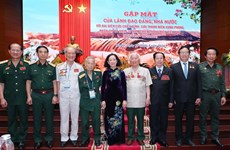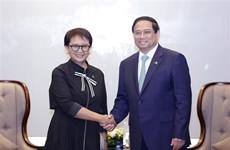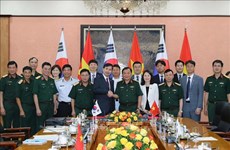Party establishment – historical turning-point of VN revolution
The birth of the Party on Feb. 3, 1930
was a significant
turning-point in the history of VN's revolution.
The birth of the Communist Party of Vietnam (CPV) on February 3, 1930
was an extremely important historical event and a significant
turning-point in the history of the Vietnamese revolution, marking a
brilliant milestone in the country’s development path.
Party establishment context
In the late 19th and early 20th century, capitalism shifted from free competition to imperialism, resulting in miserable conditions for the working class. As contradictions between colonial nations and colonialism became more and more severe, the national liberation movement began to take root across colonial countries.
With the victory of the 1917 Russian October Revolution, the Marxism-Leninism theory became a reality and opened a new era – one of anti-imperialism revolution and national liberation. It set an example for oppressed nations to liberate themselves.
The birth of the Communist International (Third International) in March 1919 boosted the development of international communist and workers’ movements. For Vietnam, the Communist International played an important role in spreading Marxism-Leninism thought and establishing the CPV.
In 1858, French colonialists invaded Vietnam and gradually established a ruling apparatus in the country, transforming it from a feudal state into a colonial-feudal one.
Politically, France imposed a colonial ruling policy, taking away the Nguyen feudal administration’s internal and external powers and dividing Vietnam into three regions – North, Central and South – and implementing a ruling regime in each region.
Economically, French colonialists seized land to establish plantations, exploited natural resources, and built industrial facilities, roads, and ports serving their colonial policies.
The French also applied a despicable cultural policy designed to instil a national inferiority complex and encourage superstitious practices. Patriotic activities among Vietnamese were prohibited. They sought every way to conceal and prevent the world’s advanced culture from infiltrating and inspiring Vietnam, and implemented obscurantism policies to facilitate easier government of the country.
Under French colonialists’ ruling policies, the Vietnamese society witnessed a profound division. Among landlords, many colluded with French colonialists to increase exploitation and oppression against farmers on one side, and those with patriotism and resentment towards colonialists participated in anti-French struggles in different forms and at different levels on the other.
The peasantry, the largest force in the Vietnamese society, found itself significantly oppressed and exploited by colonialists and feudalists. The misery of Vietnamese farmers increased their hatred of imperialists and feudal lackeys, as well as reinforced their revolutionary will in the struggle for regaining their land and freedom.
The Vietnamese working class was created during French colonialism’s first exploitation, with the majority coming from the peasantry, and was also oppressed and exploited by imperialists and feudalists.
Meanwhile, the Vietnamese upper-middle class was blocked by French and Hoa (Chinese) bourgeoisie, limiting their economic strength and political position. They expressed their nationalism and patriotism at a certain level.
The lower middle class, including students, intellectuals and workers with uncertain job futures, had an unstable life and quickly became a part of the proletariat. They boasted patriotism and hatred of imperialists and colonialists as well as the capacity to acquire advanced thoughts from outside.
The oppression and exploitation of French colonial forces was felt across socio-economic demographics, inspiring the country to unite against the invading forces.
The intent was to drive away French colonialists and regain national independence and freedom for the people, as well as eliminate the feudal regime and bring democracy, rights, and land back to the people. Fighting the colonialists and liberating the nation were the top priorities.
Many patriotic movements against French colonialists took place consistently, but were never successful.
The patriotic movements from the late 19th century to the early 20th century were the continuation of the unyielding tradition of the Vietnamese people tempered during their multi-thousand-year history. However, due to the lack of sound and well-organised policies and necessary forces, these movements failed and the Vietnamese revolution sunk into a profound ideological crisis.
Nguyen Ai Quoc set up Communist Party of Vietnam
Amid the crisis on the national salvation ideas, a young man named Nguyen Tat Thanh (then Nguyen Ai Quoc, Ho Chi Minh) left the country to seek alternate ways to save the nation on June 5, 1911.
He travelled through many European, African and American countries and discovered that capitalism, colonialism and imperialism were the root of all misery for the working class in both colonisers and the colonised countries.
In 1917, he returned to France, ultimately working his way to become a member of the Socialist Party of France two years later.
In June 1919, on behalf of Vietnam and under the new name of Nguyen Ai Quoc, he presented an eight-point claim to the Versailles Conference.
In July 1920, Nguyen Ai Quoc read Lenin’s “Thesis on National and Colonial Questions”, within which he found a way to save the Vietnamese nation.
At the Congress of the Socialist Party of France in December 1920, he voted for the Third International, founded by Lenin, and joined the establishment of the Communist Party of France, becoming Vietnam’s first communist.
That important historical event marked not only Nguyen Ai Quoc turning patriotism into the Marxism-Leninism revolutionary theory of the era, but also a significant change in the path of liberating the Vietnamese nation; to save the country and liberate the nation, a proletarian revolution is the only way.
Between 1921 and 1930, Nguyen Ai Quoc worked diligently to spread Marxism-Leninism among workers’ and patriotic movements in Vietnam, as well as make theoretical preparations for the birth of a communist party in Vietnam.
He wrote a number of articles including “the Trial of French Colonialism”, delivered speeches at international congresses and conferences, and set up Thanh Nien (Young People), Cong Nong (Workers and Peasants), Linh Cach Menh (Revolutionary Soldiers) and Tien Phong (Vanguard) newspapers in a bid to popularise Marxism-Leninism in Vietnam.
In 1927, the Popularisation Department of the Union of Oppressed Nations published “Duong Cach Menh” (Revolutionary Road), a collection of Nguyen Ai Quoc’s lectures at the Vietnamese Revolutionary Youth League’s political training courses.
These served as political guideline preparations for the establishment of the CPV. Nguyen Ai Quoc affirmed that if the revolution wants to be successful, it must have a leading party. Once the party is strong, the revolution will succeed, just like a capable helmsman will ensure the smooth sailing of a boat.
During this time, Nguyen Ai Quoc focused on making organisational and personnel preparations for the establishment of the Party. He founded the Vietnamese Revolutionary Youth League in 1925, organised many personnel training courses in Guangzhou, China, and sent officials to study at the University for Oriental Studies in the Soviet Union and the Whampoa (Huangpu) Military Academy in China .
Thanks to the tireless efforts of Nguyen Ai Quoc and other revolutionists, conditions for the Party establishment matured.
In late 1929, Vietnamese revolutionists in communist organisations were aware of the necessity and urgency of the formation of a united communist party to end divisions within the communist movement in Vietnam. Nguyen Ai Quoc took the initiative in organising and chairing a Party merger conference in Hong Kong, China from January 6 to February 7, 1930.
The conference decided to merge the Indochinese Communist Party, the Communist Party of Annam and the Indochinese Communist League into the Communist Party of Vietnam.
It discussed and approved the Abridged Political Platform, the Abridged Tactics, the Abridged Programme and the Abridged Statute of the CPV. It also adopted an appeal of Nguyen Ai Quoc, on behalf of the Communist International and the CPV, to all Vietnamese nationwide on the occasion.
The merger conference served as a congress for the Party establishment. The documents adopted at the event were the first political platform of the Party.
The third National Party Congress decided to take February 3 as the founding day of the Party.-VNA
Party establishment context
In the late 19th and early 20th century, capitalism shifted from free competition to imperialism, resulting in miserable conditions for the working class. As contradictions between colonial nations and colonialism became more and more severe, the national liberation movement began to take root across colonial countries.
With the victory of the 1917 Russian October Revolution, the Marxism-Leninism theory became a reality and opened a new era – one of anti-imperialism revolution and national liberation. It set an example for oppressed nations to liberate themselves.
The birth of the Communist International (Third International) in March 1919 boosted the development of international communist and workers’ movements. For Vietnam, the Communist International played an important role in spreading Marxism-Leninism thought and establishing the CPV.
In 1858, French colonialists invaded Vietnam and gradually established a ruling apparatus in the country, transforming it from a feudal state into a colonial-feudal one.
Politically, France imposed a colonial ruling policy, taking away the Nguyen feudal administration’s internal and external powers and dividing Vietnam into three regions – North, Central and South – and implementing a ruling regime in each region.
Economically, French colonialists seized land to establish plantations, exploited natural resources, and built industrial facilities, roads, and ports serving their colonial policies.
The French also applied a despicable cultural policy designed to instil a national inferiority complex and encourage superstitious practices. Patriotic activities among Vietnamese were prohibited. They sought every way to conceal and prevent the world’s advanced culture from infiltrating and inspiring Vietnam, and implemented obscurantism policies to facilitate easier government of the country.
Under French colonialists’ ruling policies, the Vietnamese society witnessed a profound division. Among landlords, many colluded with French colonialists to increase exploitation and oppression against farmers on one side, and those with patriotism and resentment towards colonialists participated in anti-French struggles in different forms and at different levels on the other.
The peasantry, the largest force in the Vietnamese society, found itself significantly oppressed and exploited by colonialists and feudalists. The misery of Vietnamese farmers increased their hatred of imperialists and feudal lackeys, as well as reinforced their revolutionary will in the struggle for regaining their land and freedom.
The Vietnamese working class was created during French colonialism’s first exploitation, with the majority coming from the peasantry, and was also oppressed and exploited by imperialists and feudalists.
Meanwhile, the Vietnamese upper-middle class was blocked by French and Hoa (Chinese) bourgeoisie, limiting their economic strength and political position. They expressed their nationalism and patriotism at a certain level.
The lower middle class, including students, intellectuals and workers with uncertain job futures, had an unstable life and quickly became a part of the proletariat. They boasted patriotism and hatred of imperialists and colonialists as well as the capacity to acquire advanced thoughts from outside.
The oppression and exploitation of French colonial forces was felt across socio-economic demographics, inspiring the country to unite against the invading forces.
The intent was to drive away French colonialists and regain national independence and freedom for the people, as well as eliminate the feudal regime and bring democracy, rights, and land back to the people. Fighting the colonialists and liberating the nation were the top priorities.
Many patriotic movements against French colonialists took place consistently, but were never successful.
The patriotic movements from the late 19th century to the early 20th century were the continuation of the unyielding tradition of the Vietnamese people tempered during their multi-thousand-year history. However, due to the lack of sound and well-organised policies and necessary forces, these movements failed and the Vietnamese revolution sunk into a profound ideological crisis.
Nguyen Ai Quoc set up Communist Party of Vietnam
Amid the crisis on the national salvation ideas, a young man named Nguyen Tat Thanh (then Nguyen Ai Quoc, Ho Chi Minh) left the country to seek alternate ways to save the nation on June 5, 1911.
He travelled through many European, African and American countries and discovered that capitalism, colonialism and imperialism were the root of all misery for the working class in both colonisers and the colonised countries.
In 1917, he returned to France, ultimately working his way to become a member of the Socialist Party of France two years later.
In June 1919, on behalf of Vietnam and under the new name of Nguyen Ai Quoc, he presented an eight-point claim to the Versailles Conference.
In July 1920, Nguyen Ai Quoc read Lenin’s “Thesis on National and Colonial Questions”, within which he found a way to save the Vietnamese nation.
At the Congress of the Socialist Party of France in December 1920, he voted for the Third International, founded by Lenin, and joined the establishment of the Communist Party of France, becoming Vietnam’s first communist.
That important historical event marked not only Nguyen Ai Quoc turning patriotism into the Marxism-Leninism revolutionary theory of the era, but also a significant change in the path of liberating the Vietnamese nation; to save the country and liberate the nation, a proletarian revolution is the only way.
Between 1921 and 1930, Nguyen Ai Quoc worked diligently to spread Marxism-Leninism among workers’ and patriotic movements in Vietnam, as well as make theoretical preparations for the birth of a communist party in Vietnam.
He wrote a number of articles including “the Trial of French Colonialism”, delivered speeches at international congresses and conferences, and set up Thanh Nien (Young People), Cong Nong (Workers and Peasants), Linh Cach Menh (Revolutionary Soldiers) and Tien Phong (Vanguard) newspapers in a bid to popularise Marxism-Leninism in Vietnam.
In 1927, the Popularisation Department of the Union of Oppressed Nations published “Duong Cach Menh” (Revolutionary Road), a collection of Nguyen Ai Quoc’s lectures at the Vietnamese Revolutionary Youth League’s political training courses.
These served as political guideline preparations for the establishment of the CPV. Nguyen Ai Quoc affirmed that if the revolution wants to be successful, it must have a leading party. Once the party is strong, the revolution will succeed, just like a capable helmsman will ensure the smooth sailing of a boat.
During this time, Nguyen Ai Quoc focused on making organisational and personnel preparations for the establishment of the Party. He founded the Vietnamese Revolutionary Youth League in 1925, organised many personnel training courses in Guangzhou, China, and sent officials to study at the University for Oriental Studies in the Soviet Union and the Whampoa (Huangpu) Military Academy in China .
Thanks to the tireless efforts of Nguyen Ai Quoc and other revolutionists, conditions for the Party establishment matured.
In late 1929, Vietnamese revolutionists in communist organisations were aware of the necessity and urgency of the formation of a united communist party to end divisions within the communist movement in Vietnam. Nguyen Ai Quoc took the initiative in organising and chairing a Party merger conference in Hong Kong, China from January 6 to February 7, 1930.
The conference decided to merge the Indochinese Communist Party, the Communist Party of Annam and the Indochinese Communist League into the Communist Party of Vietnam.
It discussed and approved the Abridged Political Platform, the Abridged Tactics, the Abridged Programme and the Abridged Statute of the CPV. It also adopted an appeal of Nguyen Ai Quoc, on behalf of the Communist International and the CPV, to all Vietnamese nationwide on the occasion.
The merger conference served as a congress for the Party establishment. The documents adopted at the event were the first political platform of the Party.
The third National Party Congress decided to take February 3 as the founding day of the Party.-VNA













